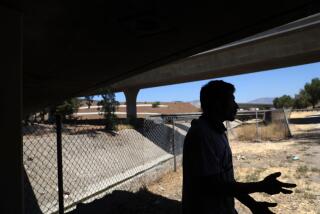Homeless Say Shelter’s Rules Are Too Strict
The rules hang on the wall to your right as you walk into the Family Shelter for the Homeless--all earnings will be surrendered, no spending money without approval, no broken curfews, no missed chores, no missed appointments.
The crisply made beds, spotless hallways and orderly kitchen seem a testament to the success of the 15-year-old, 63-bed shelter, set up to rescue homeless families from the street and “restore structure to their unstructured lives.”
But outside the Long Beach center one afternoon this week, about 15 homeless people stood in quiet protest.
“Homelessness Is Not a Crime, Don’t Treat Us Like Prisoners,” one of their cardboard signs read.
While staff members contend that the rules are strict to teach responsibility, several homeless residents and their supporters said the shelter is run by a “benevolent dictator” and her rules are “oppressive.”
The families complain that unyielding staff members have denied milk to babies, forced mothers to walk the streets, and reduced needy people to the status of “cattle.”
This week, at least five of them filed their complaints with the Legal Aid Foundation of Long Beach, which has asked for an accounting of the shelter’s funding.
Families must agree to turn over their earnings to a caseworker upon entering the shelter, an aging, converted hospital a few blocks outside of downtown. In exchange, they are given a large room with several beds, shampoo, soap, razors, laundry facilities and a caseworker who devises a plan to find a job and a place to live.
The families are expected to leave the premises between 9 a.m. and noon and from 1 to 4 p.m. daily to look for work or housing.
But when there are no appointments to keep, residents say they are forced to wander the surrounding high-crime streets without so much as pocket money, even when it rains.
Breakfast is served from 6 to 6:30, whether or not the younger children are willing to eat it; no money is provided for snacks if the children get hungry before lunch is served at noon, several parents complained. A resident named Mary said she twice sold her plasma for $13 and spent most of it on snacks for her 3-year-old daughter.
Lewis Wilson, a father of three, said he has been repeatedly denied milk for his baby and told to fill the bottle with water instead.
“We are treated like we are in a foster home or a prison,” Wilson said. “They turn us into bums. We have to beg for money.”
Three violations of the rules are grounds for eviction, according to the shelter’s written policy, and residents say there is no due process.
Gina Pederson, a 17-year-old mother, said she was told to leave this week because she twice missed appointments with her caseworker and once violated curfew by 20 minutes. She said her job cleaning houses in Newport Beach forced her to break the appointments and her caseworker has refused to reschedule.
“I ain’t got nowhere to go,” Pederson said, standing over her sleeping son during Monday’s protest.
“We’re not cattle,” said Angela Streat, who came to the shelter recently with her baby girl. She claims she was told she would have to be gone six hours a day despite her weak health.
Lupe Macker--regional director of Catholic Charities, which runs the shelter--acknowledged that the rules are strict but denied that families are mistreated.
“I don’t know where these allegations are coming from,” she said. “I assure you, our purpose is not to make their lives more difficult, but to help them make some changes.”
Macker said there is plenty of powdered milk and juice on hand when whole milk runs out, that families are welcome to stay in when it rains and caseworkers will bend the rules for just cause.
“The rules may not be pleasant for the residents, they come from unstructured backgrounds, but we don’t run a Band-Aid program with three meals a day, a bed and some child care. We are trying to help them to become fully functioning human beings,” Macker said.
The shelter claims to have a success rate as high as 70% for those who carry out their caseworkers’ plans. Success is defined as maintaining financial stability and a home.
But Macker could not say how many families are evicted or drop out of the shelter because they cannot or will not abide by the rules and wind up back on the streets.
If life at the shelter fails, the only alternative for families in Long Beach is the Long Beach Rescue Mission. There, however, men and women live in separate quarters and residents are required to take part in a religious program, to which some homeless people are morally opposed, advocates and social workers say.
The homeless say they have decided to stay and protest, fueled in part by a recently formed union of activists, many of whom are homeless themselves.
“Lupe Macker is a benevolent dictator,” charged Martha Bryson, president of the union, which recently changed its name to the Homeless Organizing Committee. “The homeless ask their caseworkers for help (special consideration) and they are repeatedly told, ‘You agreed to the rules and we can’t bend them.’ ”
The residents have demanded that a committee be formed--with half its members to be homeless people--to examine the shelter’s rules.
More to Read
Sign up for Essential California
The most important California stories and recommendations in your inbox every morning.
You may occasionally receive promotional content from the Los Angeles Times.






